- Home
- David Leavitt
Florence Page 3
Florence Read online
Page 3
While James agreed with Ruskin that ‘A cabstand is a very ugly and dirty thing, and Giotto’s Tower should have nothing in common with such conveniences,’ he considered that ‘discord for discord, there isn’t much to choose between the importunity of the author’s personal ill-humour and the incongruity of horse-pails and bundles of hay’.
What most troubled James about Ruskin’s ‘insidious and insane’ tract, however, was its preoccupation with the idea of error. ‘A truce to all rigidities is the law of the place,’ he noted in a Paterian moment. ‘Differences here are not iniquity and righteousness; they are simply variations of temperament, kinds of curiosity.’ For James, Ruskin is a kind of priggish deacon or schoolmaster, a forerunner of Forster’s Reverend Eager, leading his flock on a theological/art historical tour of the city. ‘Nothing in fact is more comical,’ James observed, ‘than the familiar asperity of the author’s style and the pedagogic fashion in which he pushes and pulls his unhappy pupils about, jerking their heads toward this, rapping their knuckles for that, sending them to stand in corners and giving them Scripture texts to copy.’
This is Reverend Eager to a tee: what he wants to teach his parishioners is ‘how to worship Giotto, not by tactile valuations, but by the standards of the spirit’. For Reverend Eager, the significance of Santa Croce lies not in its inherent beauty, nor in its status as the ‘pantheon’ of Florence’s illustrious dead (Machiavelli, Michelangelo, Rossini), but in the fact that it was ‘built by faith in the full fervour of medievalism, before any taint of the Renaissance had appeared’. In this regard he typifies the English tendency to extol what Pater called the ‘rude strength’ of the Middle Ages at the expense of corrupting Renaissance innovations. Aesthetics, for Forster, encode politics, and behind Reverend Eager’s tedious encomia to Giotto one hears the parliamentarian Henry Labouchère decrying the ‘insufficiency of the severest sentence that the law allows’ in the case of Oscar Wilde. One also hears the critics and curates who attacked Pater’s The Renaissance on its publication, accusing its author of immorality and anti-religiosity, of leading ‘minds weaker than [his] own’ into the cave of error. Even as fine a mind as George Eliot dismissed the book as ‘quite poisonous in its false principles of criticism and false conception of life’, and Pater, in a gesture of cowardly back-pedalling, removed the famous ‘Conclusion’ from the second edition, restoring it only in 1888. (He had been concerned, he wrote, that ‘it might possibly mislead some of those young men into whose hands it might fall. On the whole, I have thought it best to reprint it here, with some slight changes which bring it closer to my original meaning.’)
The danger of The Renaissance, in the view of its critics, lay in Pater’s advocacy of sensory experience, which was seen by the Reverend John Wordsworth, among others, as suggesting ‘that no fixed principles either of religion or morality can be regarded as certain, that the only thing worth living for is momentary enjoyment and that probably or certainly the soul dissolves at death into elements which are destined never to reunite’. In fact, Pater had little interest in the afterlife; his primary concern was with apprehension itself, as evidenced by the credo: ‘Not the fruit of experience, but experience itself, is the end.’ By contrast, progress, expansion and Empire were the watchwords of the Victorians, of whom he might have been speaking when he noted that in the Middle Ages, ‘the crushing of the sensuous, the shutting of the door upon it, the ascetic interest, is already traceable’.
It was against the Victorian creed of self-discipline and self-denial that Pater, knowingly or otherwise, waged battle in The Renaissance, not directly, but rather by exalting its opposite: ‘any stirring of the senses, strange dyes, strange colours, and curious odours, or work of the artist’s hands, or the face of one’s friend’. He writes approvingly of play, ‘the unexpected blessedness of what may seem our least important part of time; not merely because play is in many instances that to which people really apply their own best powers, but also because at such times, the stress of our servile, everyday attentiveness being relaxed, the happier powers in things without us are permitted free passage, and have their way with us’.
Nor does Pater shrink, as this passage indicates, from explicitly erotic language, even if he eschews, in The Renaissance, any direct mention of sex. Instead language does the job, so that when, in his most famous phrase, he describes success in life as ‘to burn with this hard, gemlike flame, to maintain this ecstasy’, he ends up giving voice to the more explicit frustrations that we have come to look at as definitive of his epoch. A brazen age is impatient for spectacular gestures, but in those years the mere evocation of David and Jonathan or ‘the Greeks’ – even the utterance of the word ‘Hellenic’ – awakened the possibility of a life free from the punitive rigidities of Victorianism. As a result, the term ‘aesthetic’ began to be looked upon as having lewd or improper connotations. By 1903, Rollo St Clair Talboys, tutor to Ronald Firbank, was worrying lest his young charge should fall prey to ‘the cult of the purple orchid’ and become ‘a Parisian mondain of the de Goncourt school ... a slave of the senses – an emotional bon vivant to the last tremolo’. Firbank did, and worse: in his later writing we see Pater’s ideas not so much in full flower as at that stage when the petals are beginning to brown, and the heady apricot scent has given way to something mulchy and rotten-sweet.
More about Firbank later. For now, let us consider another English writer who settled in Florence, the novelist Louisa Ramé, better known as Ouida.
Born in 1839 in the village of Bury St Edmunds to a French father and an English mother, Ouida started writing early on, taking as a nom de plume a childhood mispronunciation of her own name. Profit and popularity came swiftly for her, thanks in part to the velocity with which she churned out her turgid, semi-literary novels, which had titles like Granville de Vigne, Idalia, Pascarel, In Maremma, Two Little Wooden Shoes and A Dog of Flanders (she adored dogs). Neither beautiful nor elegant, Ouida enjoyed, nonetheless, an expensive and extravagant life, ordering most of her clothes from Worth and giving parties in her suite at the Langham Hotel in London. She considered herself daring; at these parties, a sign was sometimes posted that read ‘Morals and Umbrellas to be Left at the Door’. In the early 1870s – in part, at least, because she was suffering from bronchitis – she moved with her mother to Florence, renting the Villa Farinola in Scandicci (today she could take the tram into town) and throwing herself full force into the social life of the Anglo-Florentine colony, which was then about thirty years old. Although English writers had been traveling to Florence for centuries – among them John Evelyn, Milton, Boswell, Byron, and the Shelleys – the community had only really become entrenched in the 1840s, when Fanny Trollope had established the first Anglo-Florentine dynasty (and literary salon) at the Villino Trollope on the Piazza Maria Antonia (now the Piazza dell’Indipendenza). Her son Thomas carried on the tradition, first at the Villino, then at the Villa Ricorboli, beyond the Porta San Niccolò. Presently the Brownings showed up, settling at Casa Guidi near the Pitti Palace; by this time Florence had started to be known as a refuge for expatriate intellectuals. ‘Ville toute Anglaise,’ the Goncourt brothers, Jules and Edmond, declared of the city in 1855, ‘where the palaces are almost the same dismal black as the city of London, and where everything seems to smile upon the English …’ By the time Ouida got there (she was thirty-two), thirty thousand of the two hundred thousand residents of Florence were English or American.
Ouida seems now to have decided to make it one of her Florentine priorities to fall in love. As a suitor, she chose the Marchese della Stufa, who lived not far from her in Scandicci, in a house called Castagnolo. The unmarried Marchese was a scion of the old Florentine aristocracy, a gentleman-in-waiting to King Umberto and a landowner who treated both his agricultural and social duties with the utmost gravity. A few years earlier, in the company of an Englishman named Dr Clement, he had traveled to Burma to investigate the possibility of building a railroad from Mandalay to Rangoon, but noth
ing had come of the project, and he had returned to Florence, where he now took to escorting not only Ouida but the woman who would become her rival, Janet Ross.
Much has been written, over the years, about Janet Ross, and from what I have read of it, I have developed an intense dislike for the woman. No doubt she was both shrewder and more intelligent than Ouida, yet she hated dogs, and appears to have cultivated with alacrity her own reputation for being ‘formidable’. Even her daughter, Lina Waterfield, and her granddaughter, Kinta Beevor – both of whom wrote memoirs of Anglo-Florentine life – seem to have found her intimidating and mean. Herself the author of numerous books, among them Old Florence and Modern Tuscany and the 1899 Leaves from Our Tuscan Kitchen (one of the first Italian cookbooks ever published in England and – if the instructions to cook spaghetti ‘for nearly twenty minutes’ are to be taken as an example – very much geared to Victorian tastes; either that, or pasta was a lot thicker in those days), Mrs Ross held court first at Castagnolo, which she rented from the Marchese, then at Poggio Gherardo, near Settignano, one of the villas in which the storytellers gather in Boccaccio’s Decameron. Here she distilled a famous vermouth according to a secret recipe that she claimed to have been given by the last of the Medicis, and sold it at the Army and Navy stores in London. Her husband, Henry Ross, was a banker, but she appears to have had little to do with him, and for social purposes, at least, to have sought out the company of her landlord. Then as now, women in the colony whose husbands did not like to go out much had to content themselves with homosexual ‘walkers’ – a version of the Florentine cicisbeo – and this was in all probability the kind of relationship that Mrs Ross enjoyed with the Marchese when Ouida decided to thrust herself into the picture.
Poor Ouida! She simply didn’t get it. Although she considered herself forward-thinking, even naughty, in comparison to the Anglo-Florentines she was a naïf. When the Marchese refused her demand that he give up his friendship with Mrs Ross as proof of his loyalty to her, she took it for granted that the two were having an affair, and as an act of vendetta, quickly dispatched Friendship, a rubbishy roman-à-clef in which she cast the Marchese as the dashing Prince Ioris, herself as the tubercular ingénue Etoile, and Mrs Ross as the shrewish mondaine Lady Joan Challoner, who blackmails the good-natured prince in order to guarantee his fidelity. To avoid a libel suit, Ouida also cast Rome as Florence, with the flat campagna doing a particularly bad job of interpreting the countryside around Scandicci.
Mrs Ross was outraged. Soon rumor had her attempting to horsewhip Ouida on Via Tornabuoni, and Ouida shooting at Mrs Ross in her villa. All of this is nonsense; what is certain is that Mrs Ross nursed an intractable grudge about the affair, and was said still to be keeping a copy of Friendship in her bathroom for use as toilet paper even years after Ouida had died in Viareggio, destitute and forgotten, having starved herself to feed her many dogs.
Ouida is typical of the sort of mediocrity that Florence has latterly attracted. Better writers (Forster, James) came early and left, or came after they were already famous (Browning, Landor). Although Aldous Huxley loved Florence at first, his enthusiasm palled quickly, leading him to move his family to Rome. (In a letter to his brother he wrote, ‘After a third-rate provincial town, colonized by English sodomites and middle-aged Lesbians, which is, after all, what Florence is, a genuine metropolis will be lively.’) In his Italian diaries, Goethe virtually ignores Florence, noting only that:
I took a quick walk through the city to see the Duomo and the Battistero. Once more, a completely new world opened up before me, but I did not wish to stay long. The location of the Boboli Gardens is marvellous. I hurried out of the city as quickly as I entered it.
Although Goethe never specifies what drove him to leave so precipitously, a palpable air of unease hangs over this paragraph. Nor is he the only writer whose descriptive capacities the city’s darker aspect has managed to flummox. Even James was left at a loss for words, attributing to Florence ‘a kind of grave radiance – a harmony of high tints – which I scarce know how to describe’. Many years later Firbank called Florence ‘a rather sinister city’, and through the voice of Countess Yvorra in The Flower Beneath the Foot, implicitly lampooned the river view for which Lucy Honeychurch hearkens:
Ah, and Florence, too, I regret to say I found very far from what it ought to have been!!! I had a window giving onto the Arno, and so I could observe … I used to see some curious sights! I would not care to scathe your ears, my Innocent, by an inventory of one half of the wantonness that went on; enough to say the tone of the place forced me to fly to Rome, where beneath the shadow of dear St Peter’s I grew gradually less distressed.
This last line may also be a gentle elbowing of A Room with a View, since in the novel Charlotte Bartlett, to save Lucy from the predatory influences of George Emerson, absconds with the girl to Rome. In both books, Rome – that capital in which Catholic piety shares such an uneasy bed with Pagan splendor – offers itself as an antidote to Florentine dissolution, a place to recuperate and seek absolution. Yet the medicine works in neither case, and in Forster’s words, ‘the companion who is merely uncongenial in the medieval world becomes exasperating in the classical’. Florence, with its dark alleys, its death worship and sexual secrets, wins out not just for Lucy, but for Isabel Archer, whose Tuscan seduction leads only to the bankrupt Roman marriage that is at the heart of The Portrait of a Lady.
As for the writers who stayed in Florence, they wrote mostly about Florence, and themselves: literary travel guides, art history, history, romans-à-clef, and of course endless memoirs. Garden know-how combined with gossip is the classic recipe for the Anglo-Florentine memoir, which usually devolves, at some point, into a catalogue of the famous, glimpsed and chatted with. Thus Acton writes in Memoirs of an Aesthete:
In Florence there was a plethora of writers, and you were bound to meet them in the Via Tornabuoni; D.H. Lawrence with his Rubens frau and his string bag after marketing; Norman Douglas chewing the cud of a Toscano; Ronald Firbank capering into a flower-shop; Aldous Huxley who maintained that in Florence ‘every prospect pleases, but only man is vile’; Scott Moncrieff, who kept up a doggerel offensive against the Sitwells in The New Witness: dining at Betti’s, scandal-mongering in Orioli’s bookshop, drinking vermouth at Casone’s, there was no avoiding one of these in the city …
Acton’s prose is at once listless and list-y, as arid as the world it seeks to portray. If he was the scribe of Florence in the nineteen twenties, he was also its avatar, promoting across the channel an image of the city as a Shelleyesque ‘paradise of exiles’. Thus when the young Evelyn Waugh (Acton’s boyfriend at Oxford) was offered the chance to become Scott Moncrieff’s secretary, he lapsed into a reverie in which he was ‘drinking Chianti under olive trees and listening to discussions of all the most iniquitous outcasts of Europe’. (In the event, the job fell through.) Likewise the young Jocelyn Brooke, in a memoir of ‘Miss Wimpole’ published in Private View (1954), described a colony synonymous, at least for those back in England, with impropriety:
Dark hints would be dropped in undertones: Mrs. So-and-so, it seemed, had met Mr Watkins in Florence, and it was said… Oh yes, it was common talk among the English colony … Why, the wretched woman had actually admitted it, quite openly … And that poor Miss Shute – so talented – one feels quite sorry for her … Oh no, no doubt at all – Mrs Bellingham actually saw her, coming out of the Red Lion … Such a pity – but of course, after that, one can hardly have her to the house, can one?
The reality was rather more tepid. Although there were feuds galore, they were usually more on the level of petty squabbling than Shakespearean drama. (An example is Vernon Lee’s long feud with Berenson, after he accused her of plagiarism.) The Bohemianism of the Anglo-Florentines, moreover, was of a distinctly neutered variety. In England they had lived under the threat of social ostracism or even arrest and imprisonment. In Italy they were freed from this threat, yet rather than exult in their liberty,
they created for themselves a society as artificial as the ‘miniature castle’ that Lord Richard Vermont builds in Osbert Sitwell’s poem ‘Milordo Inglese’, complete with ‘miniature’ palace intrigues. (We will return to Sitwell’s poems later. For the moment, suffice it to say that an odor of frantic exhaustion clings to them – of children resisting the dusk that will cut off their games.)
In the end, it was less iniquity than spitefulness that distinguished the community. Reviewing Friendship in The Atlantic Monthly, Harriet Waters Preston complained of the colony’s ‘frivolity and irresponsibility, its meanness, moral and pecuniary, its prostrate subservience to rank, and its pest of parasitic toadies and busy bodies …’ Eccentricity itself grew wearisome. ‘There was a Marchese Fioravanti, a passionate anglophile who gave parties at which guests danced Scottish reels,’ writes Caroline Moorehead in her fine biography of the writer Iris Origo. The Marchese also kept a pet crocodile in a pond, ‘netted over so that it could not escape, and carried down to the cellar on a stretcher by four men when it showed signs of wanting to hibernate’. When the crocodile died, the Marchese ‘had a proper funeral held in its honour, and forever after suspected his mother of its murder’.
John Singer Sargent, though born in Florence, told Acton that he could not paint there. ‘The creative artist striving for self-expression must end by feeling oppressed by so much beauty,’ wrote Acton (who knew), ‘weighed down, like Atlas, with the whole world of art on his shoulders. Where taste is uniformly exquisite, where one is surrounded by masterpieces, one loses initiative in a cloud of wonder. All one’s efforts appear to be dwarfed. One asks oneself: what’s the use?’
On the other hand, in such an atmosphere the amateur flourishes; as Acton observed of his parents’ generation, ‘they wrote, they painted, they composed, they collected …’ When Mary McCarthy came to Florence in the late 1950s, she showed little patience for the city’s foreign colony, on which she blamed the dissemination of a ‘false idea of Florence … a tooled-leather idea of Florence as a dear bit of the old world. Old maids of both sexes – retired librarians, governesses, ladies with reduced incomes, gentlemen painters, gentlemen sculptors, gentlemen poets, anaemic amateurs and dabblers of every kind – “fell in love” with Florence and settled down to make it home.’

 Shelter in Place
Shelter in Place The Man Who Knew Too Much: Alan Turing and the Invention of the Computer (Great Discoveries)
The Man Who Knew Too Much: Alan Turing and the Invention of the Computer (Great Discoveries)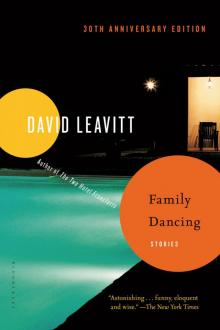 Family Dancing
Family Dancing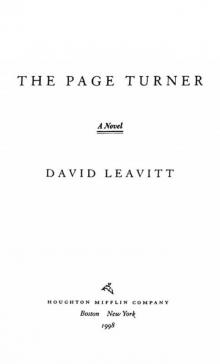 Page Turner Pa
Page Turner Pa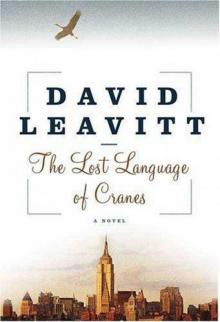 The Lost Language of Cranes: A Novel
The Lost Language of Cranes: A Novel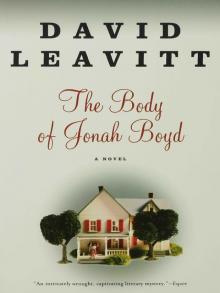 The Body of Jonah Boyd
The Body of Jonah Boyd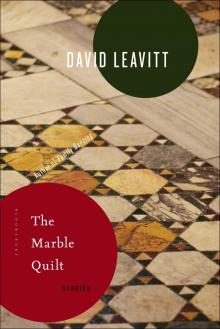 The Marble Quilt
The Marble Quilt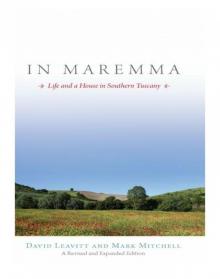 In Maremma
In Maremma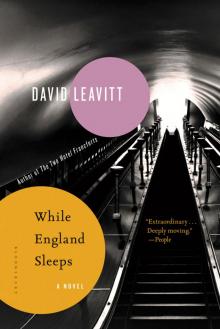 While England Sleeps
While England Sleeps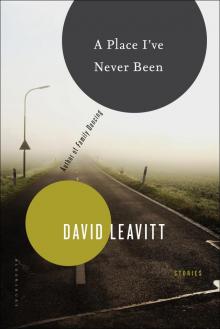 A Place I've Never Been
A Place I've Never Been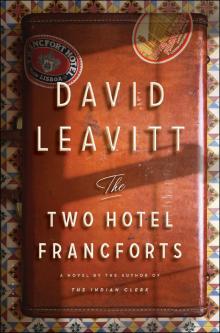 The Two Hotel Francforts
The Two Hotel Francforts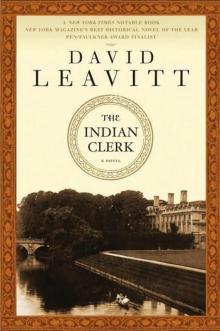 The Indian Clerk
The Indian Clerk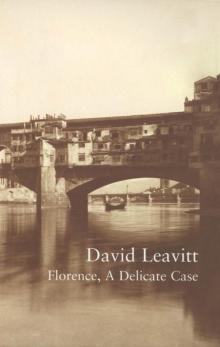 Florence
Florence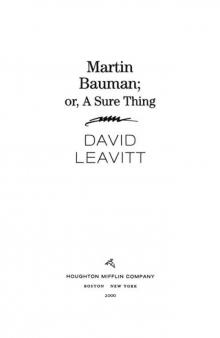 Martin Bauman
Martin Bauman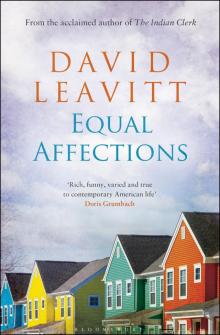 Equal Affections
Equal Affections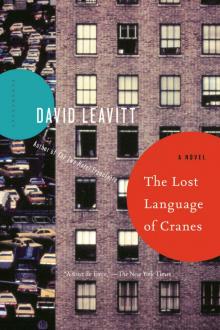 The Lost Language of Cranes
The Lost Language of Cranes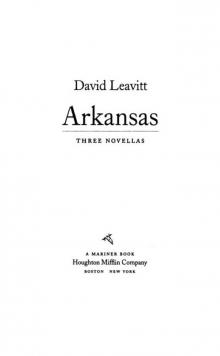 Arkansas
Arkansas